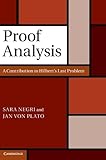Proof analysis: a contribution to Hilbert's last problem Negri, Sara
Publication details: 2011 Cambridge University Press Ney YorkDescription: xi, 265 pISBN:- 9781107008953
- 511.36 N3P7
| Item type | Current library | Collection | Call number | Status | Date due | Barcode | Item holds | |
|---|---|---|---|---|---|---|---|---|
 Book
Book
|
Ahmedabad | Non-fiction | 511.36 N3P7 (Browse shelf(Opens below)) | Available | 177749 |
Browsing Ahmedabad shelves, Collection: Non-fiction Close shelf browser (Hides shelf browser)
Includes bibliographical references and index.
This book continues from where the authors' previous book, Structural Proof Theory, ended. It presents an extension of the methods of analysis of proofs in pure logic to elementary axiomatic systems and to what is known as philosophical logic. A self-contained brief introduction to the proof theory of pure logic is included that serves both the mathematically and philosophically oriented reader. The method is built up gradually, with examples drawn from theories of order, lattice theory and elementary geometry. The aim is, in each of the examples, to help the reader grasp the combinatorial behaviour of an axiom system, which typically leads to decidability results. The last part presents, as an application and extension of all that precedes it, a proof-theoretical approach to the Kripke semantics of modal and related logics, with a great number of new results, providing essential reading for mathematical and philosophical logicians.
There are no comments on this title.






